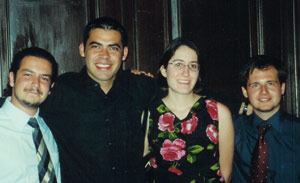Berkeleyan
Opening the ‘gateway’ to talented grad students
I-House Cabello endowment, honoring victim of Chilean coup, helps offset rising expenses
![]()
| 08 April 2004
| |  Among the first nine recipients of the newly established Gateway Fellowship are (from left) Onur Filiz, from Turkey; Giovanni Gonzalez, from Guatemala; Carolynn Roncaglia, from the United States; and Sener Akturk, from Turkey. The fellowship covers their fees and tuition, pays a cash stipend, and provides for room and board at International House. Photo courtesy International House |
Getting accepted to a selective Berkeley graduate program is only one hurdle for many first-rate students here and abroad. The next big question is how to fund their education, especially in light of rising fees.
Talented candidates from around the world now have an improved shot at a Berkeley education with the advent of the Gateway Fellowship Program, a creative partnership between the university, the Graduate Division, and International House. Under the agreement, the campus offers selected first-year grad students full funding: the department covers fees and tuition, the Graduate Division provides a $5,000 stipend, and I-House provides room and board (which costs about $10,000 per academic year). The campus has pledged to provide its share of as many as 25 of these matching scholarships each year; I-House is currently fundraising to match the offer, as part of its 75th-anniversary campaign.
This academic year, five first-year doctoral students from the U.S. and four international students received Gateway Fellowships. The I-House board’s long-term goal is to fund room and board for 25 Gateway fellows each year from the interest generated in perpetuity by 25 $250,000 named endowments, or combined contributions in smaller amounts to support the program.
Last week, the campaign got off to a resounding start with a half-million-dollar pledge from Cal alumnus Manuel Cabello and his family. Their gift is in memory of his younger brother Winston Dwight Cabello, a Chilean economist who was killed following the 1973 coup against President Salvador Allende led by Augusto Pinochet. Winston was a 28-year-old regional planning official in northern Chile who worked for the coalition Popular Unity government at the time of the coup. He was arrested the day after the coup and killed five weeks later, along with 12 other civilian prisoners. The junta allowed “big names” to leave the country, explains Manuel Cabello, director of an Oakland-based international student-exchange program. But they set out to kill “middle-level people” who could potentially lead resistance efforts.
After Winston’s body was exhumed from a common grave in 1991, the Cabello family was eventually able to bring civil charges against his murderer in a U.S. court. Last October, a Florida jury found former army officer Armondo Fernandez Larios liable for torture, crimes against humanity, and extra-judicial killing in Winston’s case. It was the first time a Pinochet government figure has been tried in the United States for human-rights abuses in Chile, and the first jury verdict in the U.S. for crimes against humanity. The jury awarded the family $4 million in damages — though, according to Manuel, they are unlikely to ever collect.
The Cabello family has deep ties to Cal. Manuel and his wife Dana (both of them Cal students at the time of the coup), and sisters Zita and Karin all earned degrees at Berkeley, as did three nieces and nephews. Niece Dania Cabello is currently a Cal varsity soccer player.
Manuel praises I-House as “a nurturing place and a symbol of internationalism.” The Gateway Fellowship, he says, is “a great opportunity” to stretch his family’s contribution to I-House through the matching agreement with the university. The Cabello family also hopes to identify individuals in Chile and elsewhere who will contribute to the endowment in Winston’s memory and is working to establish a board of scientists and academics in Chile to help identify promising Chilean scholars and guide them in applying for the Winston Cabello International House Fellowship at Berkeley. Additional information can be found at www.WinstonCabello.org.

